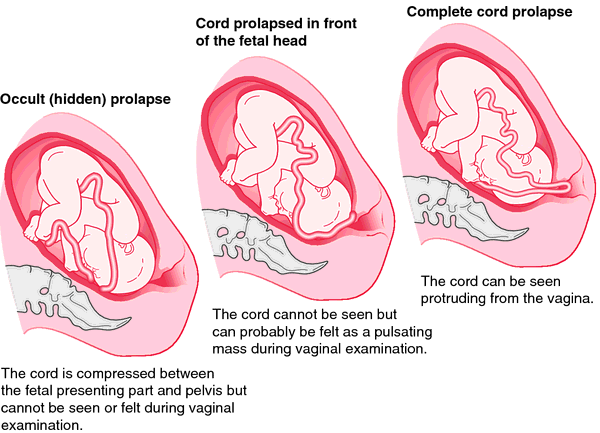prolapse
[pro´laps]1. the falling down or downward displacement of a part or viscus; called also procidentia and ptosis.
2. to undergo such displacement.
prolapse of cord protrusion of the umbilical cord ahead of the presenting part of the fetus in labor. 

Variations of prolapsed umbilical cord. From McKinney et al., 2000.
prolapse of the iris protrusion of the iris through a wound in the cornea.
mitral valve prolapse see mitral valve prolapse.
rectal prolapse (prolapse of rectum) protrusion of the rectal mucous membrane through the anus.
prolapse of uterus downward displacement of the uterus so that the cervix is within the vaginal orifice (first-degree prolapse), the cervix is outside the orifice (second-degree prolapse), or the entire uterus is outside the orifice (third-degree prolapse).
Miller-Keane Encyclopedia and Dictionary of Medicine, Nursing, and Allied Health, Seventh Edition. © 2003 by Saunders, an imprint of Elsevier, Inc. All rights reserved.
pro·ci·den·ti·a
(prō'si-den'shē-ă),A sinking down or prolapse of any organ or part; usually related to prolapse of the uterus.
[L. a falling forward, fr. procido, to fall forward]
Farlex Partner Medical Dictionary © Farlex 2012
pro·ci·den·ti·a
(pros'i-den'shē-ă)A sinking down or prolapse of any organ or part.
[L. a falling forward, fr. procido, to fall forward]
Medical Dictionary for the Health Professions and Nursing © Farlex 2012
procidentia
Displacement (PROLAPSE) especially of the womb (uterus), from its normal position. In procidentia the uterus descends through the VAGINA to a varying degree and must be retained in place either by a PESSARY or by a surgical repair.Collins Dictionary of Medicine © Robert M. Youngson 2004, 2005
pro·ci·den·ti·a
(pros'i-den'shē-ă)A sinking down or prolapse of any organ or part.
[L. a falling forward, fr. procido, to fall forward]
Medical Dictionary for the Dental Professions © Farlex 2012